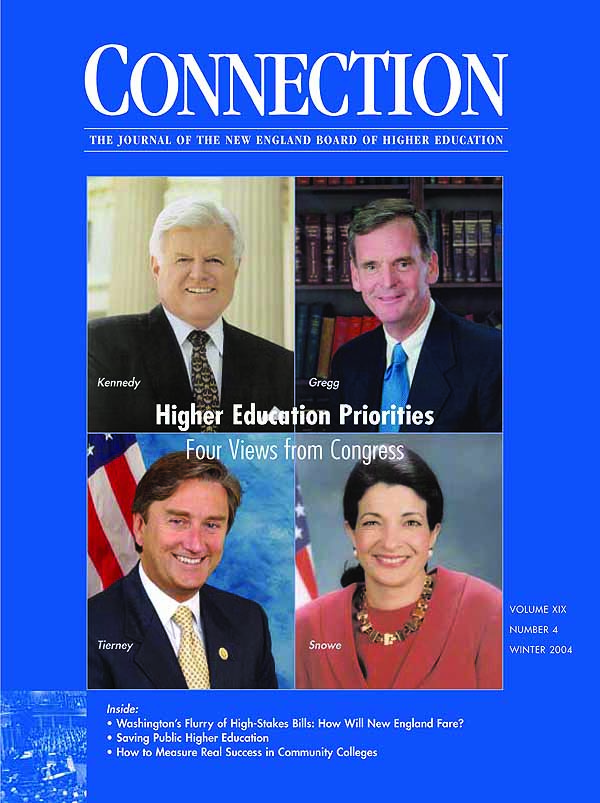
Click the cover image to view and download this issue in PDF format.
BOSTON — The upcoming reauthorization of the federal Higher Education Act could dramatically alter the relationship between the federal government and New England colleges and universities, according to the Winter 2004 issue of Connection: The Journal of the New England Board of Higher Education, which focuses on federal higher education policy.
The Winter 2004 Connection features articles by U.S. Sens. Edward M. Kennedy of Massachusetts, Judd Gregg of New Hampshire and Olympia J. Snowe of Maine and U.S. Rep John F. Tierney of Massachusetts, as well as an exclusive analysis of federal policy by Washington higher education insiders.
In addition, a Connection survey of New England’s congressional delegation suggests that health care and affordable housing are the top priorities facing the region. Connection conducted a similar survey in 1990. That year, the region’s lawmakers identified addressing environmental problems as the region’s No. 1 priority, followed, like this year, by affordable housing.
Regional Priorities: 1990 vs. 2003
| 1990 | 2003 |
| 1. Environmental problems | 1. Universal health care |
| 2. Affordable housing | 2. Affordable housing |
| 3. Federal budget deficit | 3. Health care cost containment |
| 4. Health care cost containment | 4. Energy costs |
| 5. Reform of elementary and secondary education | 5. Federal budget deficit |
| 6. Drug abuse | 6. Reform of elementary and secondary education |
| 7. Higher education costs | 7. Infrastructure |
| 8. Job training | 8. Environmental problems |
Connection is the journal of the nonprofit New England Board of Higher Education-and America’s only regional journal on higher education and the economy.
Following is a summary of articles that appear in the Winter 2004 Connection:
Billing Cycle – – In the second of a two-part series, American Council on Education Vice President of Government Relations Terry Hartle and Assistant Director of Government Relations Chris Simmons forecast how reauthorization of the federal higher education will affect New England: “The huge federal budget deficit will make it very hard, if not impossible, for Congress to make significant changes in spending,” they write. “To compensate, some policymakers have turned their attention to ‘reforming’ colleges and universities.”
Education Security for All – – U.S. Sen. Edward M. Kennedy (D-Mass.) outlines the obstacles to higher education that face different types of students and calls for cooperation between families, students, colleges, states and the federal government in achieving accessibility. “We should guarantee that if you work hard, finish high school and are admitted to college, you will be able to afford the four years it takes to earn a degree,” writes the ranking Democrat on the Senate Committee on Health, Education, Labor, and Pensions.
Training in Freedom and Civilization – – U.S. Sen. Judd Gregg (R-N.H.) calls for more emphasis in college courses on core subjects such as English, history and Western Civ. “It concerns me that on many college campuses, core classes are being squeezed out in favor of a balkanized curriculum that does not provide this kind of basic, well-rounded education,” writes the chair of the Senate Committee on Health, Education, Labor, and Pensions.
Education is Welfare Reform – – U.S. Sen. Olympia J. Snowe (R-Maine) describes Maine’s pioneering welfare-to-work program allowing parents to access higher education in order to develop knowledge and work skills. “We should encourage parents who are on welfare to use that time to prepare themselves for economic independence, whether by earning high school diplomas, receiving substance abuse treatment or pursuing longer duration vocational or postsecondary education,” writes the chair of the Senate Committee on Small Business.
Toward College Affordability – – U.S. Rep. John F. Tierney (D-Mass.) assails Republican proposals to punish colleges for tuition increases. New England’s only representative on the House Committee on Education and the Workforce also calls on state governments to provide adequate support to public institutions-or expect less federal money from Washington.
The Public Interest – – Nellie Mae Education Foundation President Blenda J. Wilson makes the case for a vibrant public higher education sector. Among other things, “private campuses simply do not have the resources, the capacity or the mandate to serve the growing number of low-income, minority students,” writes Wilson. “This will be an essential role for public campuses, which already enroll eight in 10 minority students nationally.”
Enough of Beat the Clock – – Community colleges cannot be judged by graduation rates alone. Bristol Community College President John J. Sbrega proposes a set of performance criteria to measure real success in community colleges.
University Couple – – In an exclusive Connection interview, Roger Williams University President Roy J. Nirschel and his wife Paula Nirschel discuss the university’s role in its community as well as their pioneering initiative to educate Afghan women.
Bridging the STEM Opportunity Gap – – nebhe President Robert A. Weygand warns that lack of diversity in science, technology, engineering and math fields is undermining New England’s economic future.
[ssba]
